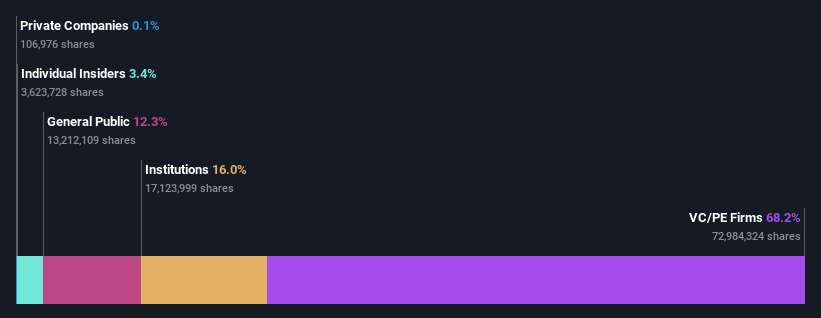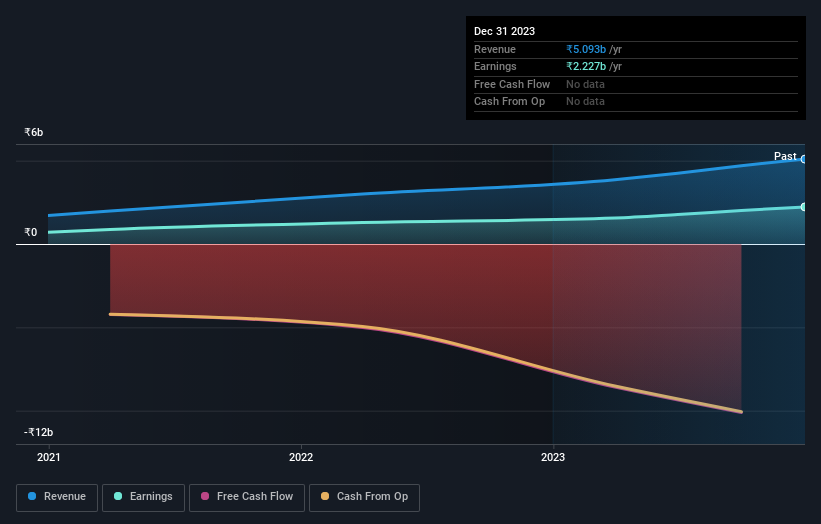Stock Analysis
- India
- /
- Diversified Financial
- /
- NSEI:INDIASHLTR
Private equity firms who hold 68% of India Shelter Finance Corporation Limited (NSE:INDIASHLTR) gained 7.2%, institutions profited as well

Key Insights
- Significant control over India Shelter Finance by private equity firms implies that the general public has more power to influence management and governance-related decisions
- A total of 2 investors have a majority stake in the company with 68% ownership
- Institutional ownership in India Shelter Finance is 16%
A look at the shareholders of India Shelter Finance Corporation Limited (NSE:INDIASHLTR) can tell us which group is most powerful. We can see that private equity firms own the lion's share in the company with 68% ownership. Put another way, the group faces the maximum upside potential (or downside risk).
While private equity firms were the group that reaped the most benefits after last week’s 7.2% price gain, institutions also received a 16% cut.
Let's take a closer look to see what the different types of shareholders can tell us about India Shelter Finance.
Check out our latest analysis for India Shelter Finance

What Does The Institutional Ownership Tell Us About India Shelter Finance?
Institutional investors commonly compare their own returns to the returns of a commonly followed index. So they generally do consider buying larger companies that are included in the relevant benchmark index.
As you can see, institutional investors have a fair amount of stake in India Shelter Finance. This can indicate that the company has a certain degree of credibility in the investment community. However, it is best to be wary of relying on the supposed validation that comes with institutional investors. They too, get it wrong sometimes. It is not uncommon to see a big share price drop if two large institutional investors try to sell out of a stock at the same time. So it is worth checking the past earnings trajectory of India Shelter Finance, (below). Of course, keep in mind that there are other factors to consider, too.

We note that hedge funds don't have a meaningful investment in India Shelter Finance. Looking at our data, we can see that the largest shareholder is WestBridge Capital Partners LLC with 47% of shares outstanding. Nexus Venture Partners is the second largest shareholder owning 21% of common stock, and Madison India Capital Management LLC holds about 4.7% of the company stock. Additionally, the company's CEO Rupinder Singh directly holds 0.9% of the total shares outstanding.
To make our study more interesting, we found that the top 2 shareholders have a majority ownership in the company, meaning that they are powerful enough to influence the decisions of the company.
While studying institutional ownership for a company can add value to your research, it is also a good practice to research analyst recommendations to get a deeper understand of a stock's expected performance. As far as we can tell there isn't analyst coverage of the company, so it is probably flying under the radar.
Insider Ownership Of India Shelter Finance
The definition of company insiders can be subjective and does vary between jurisdictions. Our data reflects individual insiders, capturing board members at the very least. Company management run the business, but the CEO will answer to the board, even if he or she is a member of it.
Most consider insider ownership a positive because it can indicate the board is well aligned with other shareholders. However, on some occasions too much power is concentrated within this group.
Our most recent data indicates that insiders own some shares in India Shelter Finance Corporation Limited. In their own names, insiders own ₹2.1b worth of stock in the ₹63b company. This shows at least some alignment. You can click here to see if those insiders have been buying or selling.
General Public Ownership
The general public-- including retail investors -- own 12% stake in the company, and hence can't easily be ignored. This size of ownership, while considerable, may not be enough to change company policy if the decision is not in sync with other large shareholders.
Private Equity Ownership
Private equity firms hold a 68% stake in India Shelter Finance. This suggests they can be influential in key policy decisions. Some investors might be encouraged by this, since private equity are sometimes able to encourage strategies that help the market see the value in the company. Alternatively, those holders might be exiting the investment after taking it public.
Next Steps:
It's always worth thinking about the different groups who own shares in a company. But to understand India Shelter Finance better, we need to consider many other factors. Take risks for example - India Shelter Finance has 1 warning sign we think you should be aware of.
Of course this may not be the best stock to buy. Therefore, you may wish to see our free collection of interesting prospects boasting favorable financials.
NB: Figures in this article are calculated using data from the last twelve months, which refer to the 12-month period ending on the last date of the month the financial statement is dated. This may not be consistent with full year annual report figures.
Valuation is complex, but we're helping make it simple.
Find out whether India Shelter Finance is potentially over or undervalued by checking out our comprehensive analysis, which includes fair value estimates, risks and warnings, dividends, insider transactions and financial health.
View the Free AnalysisHave feedback on this article? Concerned about the content? Get in touch with us directly. Alternatively, email editorial-team (at) simplywallst.com.
This article by Simply Wall St is general in nature. We provide commentary based on historical data and analyst forecasts only using an unbiased methodology and our articles are not intended to be financial advice. It does not constitute a recommendation to buy or sell any stock, and does not take account of your objectives, or your financial situation. We aim to bring you long-term focused analysis driven by fundamental data. Note that our analysis may not factor in the latest price-sensitive company announcements or qualitative material. Simply Wall St has no position in any stocks mentioned.
About NSEI:INDIASHLTR
India Shelter Finance
India Shelter Finance Corporation Limited, a housing finance company, provides home loans to low-middle income individuals in India.
High growth potential with solid track record.

